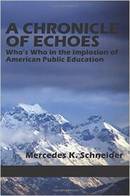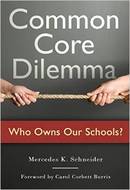The New York State Education Department (NYSED) and the NY Board of Regents are standing firm in their allegiance to the state's Common-Core-aligned exams.
Sure, there is no proof that passing a Regents exam aligned to Common Core will deliver on the ad nauseam "college and career readiness" Common Core advocates promise. There is also no proof that scoring well on a Regents Common Core exam means little more than mastering taking that exam.
When testing stakes are high, teaching and learning are replaced by concentrated test prep. That is the single direction that test-centric reform is driving public education.
And by the time that New York's Class of 2022 is ready to graduate, New York public school students had better master those Regents Common Core exams. But mastering the exams is not objective; the state is able to manipulate passing rates based upon its cut-score-to-raw-score determinations.
Until 2022, the Regents Common Core exam cut score is 65, but the raw scores associated with that 65 are in flux, and Regents does not have a handle on the fairness aspect. For the 2015 Regents algebra exam, for example, students with more than 80 percent correct were actually penalized by the Regents scoring scheme. Moreover, a student scoring 35 percent on the Regents algebra exam was credited as scoring that "proficient" 65.
In 2015, the state set the cut scores in order to achieve a particular outcome- to allow a certain percentage of students to pass. They did the same in 2014. They also did the same in 2013. The state calls this "stability of passing rates."
The state determines the percentages of students passing. This means that the state determines the percentage of students failing. The outcome of Regents exam "proficiency" rates rests with the whimsy of NYSED/Regents.
A 65 is the passing score, but what 65 means in terms of actual raw scores is in constant adjustment and re-adjustment by NYSED/Regents. This means that for the class of 2022, the passing score is to be 75 in English and 80 in math- but the raw scores associated with a 65, or 75, or 80 is not fixed. "Proficiency" air hockey.
Yet there are "gains," right?
Just dismiss any thought of a meaningful, year-to-year comparison. The state's ability to predetermine the percentages of students "passing" New York's Regents Common Core exams (and to alter raw-score-to-cut score conversions) makes any comparisons of "gains" from one year to the next wholly artificial.
By extension, passing rates for the Class of 2022 cut scores of 75 and 80 are given their applied, raw-score-conversion meaning by the state.
Until 2022, NYSED promises to offer a "local diploma safety net" from its determinations of 30-ish percent passing Regents Common Core exams.
However, I wonder if NYSED and Regents have considered the ramifications of their removal of the "safety net" come 2022.
Now, I realize that the pro-reform set such as those promoting Common Core and obviously-attendant, very high-stakes tests view public education as a web of education business opportunities.
So, NYSED and Regents would do well to consider the new education business opportunities that the looming threat of mass, would-be NYS Class of 2022 failures will yield for edupreneurs in other states.
It is national news that in 2022, many NYS seniors will likely be prevented from graduating due to not achieving that 75 in English and 80 in math (whatever the raw-score conversion NYSED/Regents might decide to affix to that 75 and 80).
By the year 2022, there will be a ready market of NYS seniors who did not pass the Regents Common Core exams and who are looking for a way to move forward with their lives.
Come 2020 or 2021, some parents of NYS Class of 2022 public school students could also be shopping for options.
The wheels of the edupreneurs must be already turning.
One possibility might be for NYS students to dodge the Regents Common Core exams by completing a semester or year enrolled in an online school in another state- and being awarded a diploma from that state upon completion of the online program.
All for a nominal fee from parents who are desperate for their children to graduate from high school- any accredited high school.
Another possibility is for two- or four-year colleges (online or brick-and-mortar) in New York or elsewhere to set the program approval wheels in motion now in order to offer those non-Regents-exam-passing NYS Class of 2022-ers the opportunity to earn some form of high-school-equivalency diploma on their way to earning an associate's or bachelor's degree.
In short, if NYSED and Regents insist upon following a course that will result in thousands of NYS Class of 2022 students failing to graduate because of their inability to pass exams that are only ideologically connected to "college and career readiness," they inadvertently create a market for alternative options for these students.
But what about the students whose parents cannot afford an alternative option?
Those students could end up making New York fall in the state rankings of Youth Opportunity-- which would signal a rise of New York youth who are neither in school nor gainfully employed.
What viable options will NYSED and Regents provide for the thousands of NYS students who likely will not pass Regents Common Core exams in 2022?
Have NY Regents Chancellor Merryl Tisch and NYS Superintendent MaryEllen Elia thought that far? Or will they simply continue to gaze at what they consider their "higher bar" with no thought to those who might not master test drill well enough to jump over it "proficiently"?
Originally posted 08-16-15 at deutsch29.wordpress.com
Schneider is a southern Louisiana native, career teacher, trained researcher, and author of the ed reform whistle blower, A Chronicle of Echoes: Who's Who In the Implosion of American Public Education.
She also has a second book, Common Core Dilemma: Who Owns Our Schools?, newly published on June 12, 2015.



